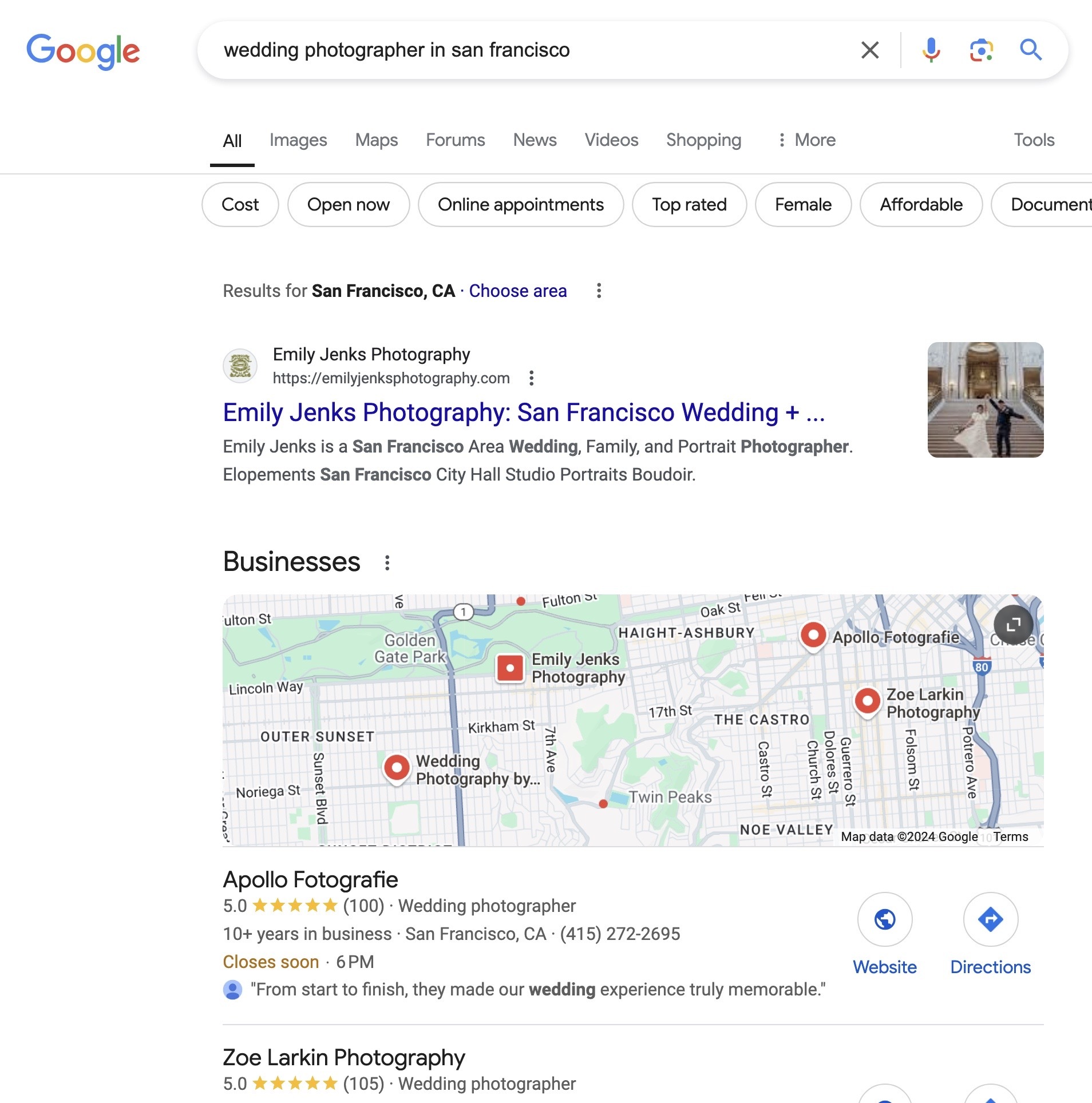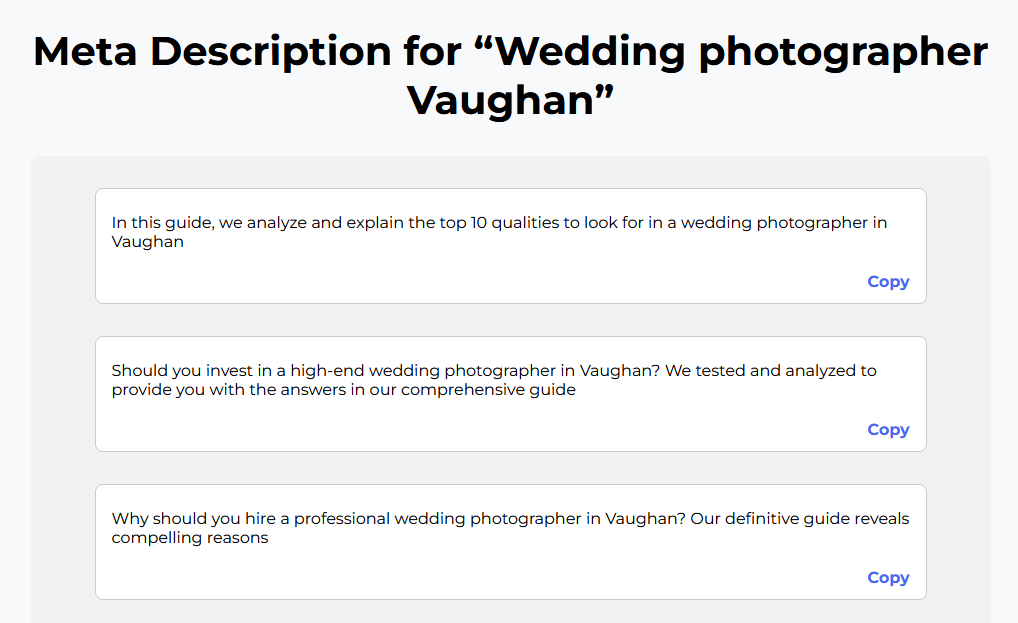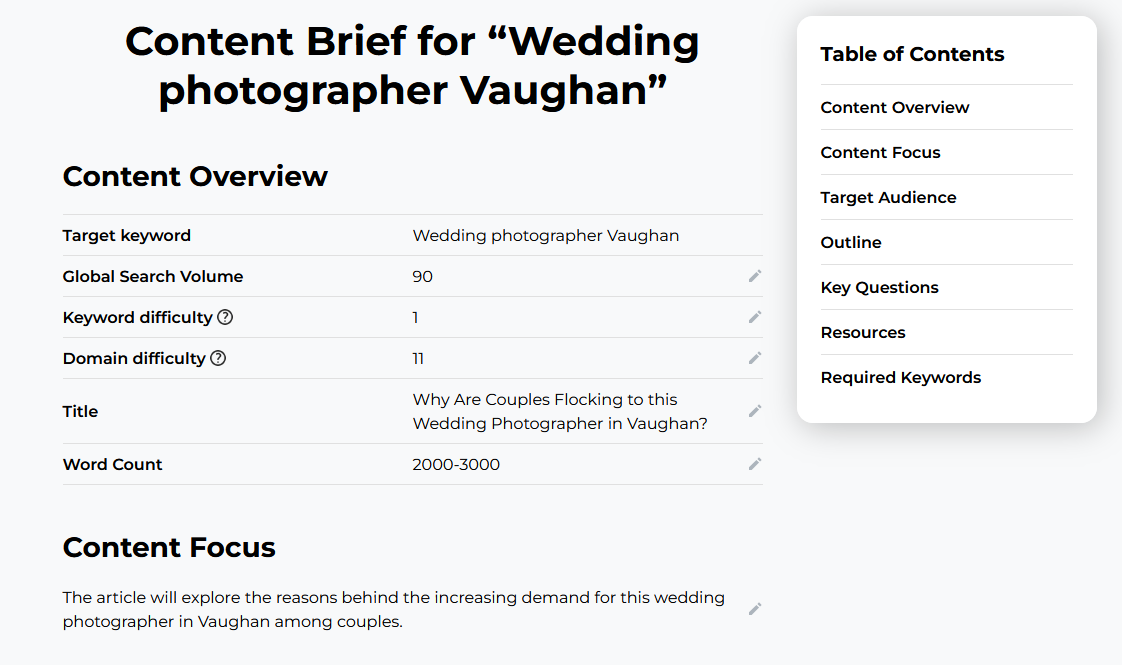
As a photographer, stunning images are just half the battle; optimizing your website with the right SEO keywords can significantly boost your visibility in search results and attract more potential clients. SEO has changed a TON in 2024, most of us are now optimizing to be featured in LLMs as well as Google.
In this guide, we’ll show you how to identify and target keywords effectively to increase your website traffic.
What are SEO Keywords For Photographers?
SEO keywords for photographers are the words and phrases your ideal clients are typing into search engines when they’re looking for a photographer like you. Think of them as the digital breadcrumbs that lead people straight to your website. Whether your potential client is searching for “wedding photographer in [city]” or “affordable portrait photography,” using the right keywords ensures you’re found when it matters most.
Take a look at this example, when we Google the seo keyword: “wedding photographer in San Francisco” the #1 ranking result for Emily Jenks Photography website – this photographer did an amazing job optimizing the title tag to have those exact words in it:
The trick is to know what your clients are asking and how they describe the photography services they need. These keywords could range from broad terms like “professional photographer” to niche phrases like “real estate photographer in san francisco.” By weaving these keywords into the title of website and content, you make it easier for potential clients to find you and get in touch when they’re ready to book.
So, if you want your photography business to show up at the right moment, focus on the keywords that speak directly to your audience and match the services they’re searching for. It’s not just about getting found—it’s about getting found by the right people!
By targeting the right SEO keywords, photographers can attract relevant traffic to their websites, ensuring that their services are seen by those actively searching for them.
Why They Matter:
- Increased Visibility: Help photographers rank higher in search engine results, making it easier for clients to find them.
- Targeted Traffic: Attract users who are specifically looking for photography services, leading to higher engagement and conversion rates.
- Niche Differentiation: Allow photographers to highlight their unique styles or services, distinguishing themselves from competitors.
- Cost-Effective Marketing: Reduce reliance on paid advertising by improving organic search rankings through optimized content.
Why Photographers Should Use Them:
- Connect with Clients: Target potential clients looking for specific services, such as “wedding photography” or “family portraits.”
- Showcase Expertise: Use relevant keywords to highlight specialties, like “commercial product photography” or “newborn photography.”
- Improve Online Presence: Optimize website content, blog posts, and social media to enhance overall search engine performance.
- Increase Bookings: Drive qualified leads that are more likely to convert into paying clients by addressing their specific needs and queries.
- For instance, a photographer specializing in newborn photography might use the keyword “newborn photographer in [City Name]” on their website and in blog posts. By optimizing their content around this keyword, they increase the likelihood of appearing in search results when parents are looking for someone to capture those precious early moments.
Here are a few examples of an SEO keyword photographer might target, and why it might be effective, along with how to judge whether to pursue it:
- “Wedding photographer in [City Name]”
- Why It Works: This keyword targets couples specifically looking for wedding photography services in a particular area, making it highly relevant.
- Judgment Criteria: Use TopicRanker or another keyword tool to check local search volume and competition; if there’s decent search volume with manageable competition, it’s worth targeting.
- “Family portrait photographer near me”
- Why It Works: It captures local intent, appealing to families seeking a nearby photographer for portraits.
- Judgment Criteria: Look for local SEO trends and Google My Business listings to assess competition and visibility in your area.
- “Professional headshots for businesses”
- Why It Works: This keyword caters to a specific client base—business professionals needing high-quality headshots, which is a growing niche.
- Judgment Criteria: Evaluate industry demand and if local businesses frequently search for these services.
- “Outdoor engagement photography in [Location]”
- Why It Works: Targets couples looking for specific styles (outdoor) and locations, which helps photographers differentiate their services.
- Judgment Criteria: Analyze seasonal trends and local engagement photography opportunities to gauge interest.
- “Newborn photography services in [City Name]”
- Why It Works: This keyword addresses new parents actively searching for specialized services, making it very niche-specific.
- Judgment Criteria: Review local birth rates and parent groups on social media to understand the demand for newborn photography.
- “Affordable real estate photography”
- Why It Works: Appeals to real estate agents or homeowners looking for cost-effective photography solutions, tapping into a specific market segment.
- Judgment Criteria: Investigate the pricing trends in your area and assess the competition to see if you can offer unique value.
- “Commercial product photography for e-commerce”
-
- Why It Works: Targets businesses in e-commerce, emphasizing a crucial need for high-quality product images to drive sales.
- Judgment Criteria: Evaluate the growth of local e-commerce businesses and assess their current marketing strategies.
- “Fine art photography workshops”
- Why It Works: Attracts aspiring photographers interested in learning, positioning the photographer as an expert in their field.
- Judgment Criteria: Check local interest in art and photography classes or workshops, and assess competitors offering similar workshops.
- “Candid wedding photography in [City Name]”
- Why It Works: Targets couples looking for a specific style (candid) in a specific location, enhancing relevance.
- Judgment Criteria: Research local wedding trends and styles preferred by couples to see if candid photography is in demand.
- “Event photographer for corporate functions”
- Why It Works: Addresses businesses that frequently host events and require professional photography, appealing to a steady market.
- Judgment Criteria: Assess the number of corporate events in your area and the availability of competitors providing this service.
Mastering SEO keywords is essential for photographers to thrive in a crowded marketplace and grow their business.
Summary: Why is SEO Important for Photographers
- Increased visibility: By targeting the right SEO keywords, you can make it easier for potential clients to find your photography website when they search for services you offer. This increased visibility can lead to more website traffic, inquiries, and bookings.
- Competitive advantage: Ranking higher than your competitors for popular photography-related keywords can give you a significant advantage in attracting clients. When you appear at the top of search results, you’re more likely to be seen as a credible and trustworthy choice, even if you’re a newer or smaller business.
- Targeted traffic: SEO keywords help you attract visitors who are specifically interested in your photography services. Unlike paid advertising, which can sometimes bring in less qualified leads, organic traffic from SEO tends to be more targeted and engaged. These visitors are actively searching for what you offer, making them more likely to become clients.
- Cost-effective marketing: Optimizing your website for SEO keywords is a relatively low-cost way to promote your photography business online. While it does require time and effort to research and implement the right keywords, the long-term benefits can be substantial compared to the ongoing costs of paid advertising.
How to Research SEO Keywords for Photographers
Researching the right SEO keywords is critical in optimizing your photography website for search engines.
Here are some techniques and tools to help you find relevant, high-performing keywords:
- Brainstorm seed keywords: Start by creating a list of broad, general keywords related to your photography services, such as “wedding photography,” “family portraits,” or “landscape photography.” These seed keywords will serve as the foundation for your keyword research.
- Use keyword research tools: Utilize popular keyword research tools like TopicRanker to expand your seed keywords and discover related terms, long-tail variations, and location-specific keywords. These tools provide valuable data on search volume, keyword difficulty, and competition levels.
- Analyze competitor keywords: Study the keywords your competitors are targeting by running their websites through keyword research tools or using competitive analysis features. This can help you identify gaps in your own keyword strategy and uncover new opportunities.
- Generate keywords from competitor URLs: Enter your competitors’ website URLs into keyword research tools to discover the keywords they are targeting and ranking for. This approach can save time and provide valuable insights into your competitors’ SEO strategies.
- Leverage Google’s autocomplete and related searches: Type your seed keywords into Google’s search bar and take note of the autocomplete suggestions and related searches at the bottom of the results page. These suggestions often reflect popular, long-tail variations of your main keywords that users are actively searching for.
- Analyze search intent and competition: When selecting keywords, consider the search intent behind each term and the level of competition. Prioritize keywords that align with your target audience’s needs and have a lower difficulty score, as these may be easier to rank for initially.
- Use long-tail keywords: Focus on longer, more specific keyword phrases that are highly relevant to your photography niche and location. Long-tail keywords typically have lower search volume but higher conversion rates, as they target users with a clear intent.
- Monitor your keyword performance: Regularly track your keyword rankings, traffic, and conversions using tools like Google Analytics and Google Search Console. This data will help you refine your keyword strategy over time and identify new opportunities for growth.
Best SEO Keywords for Wedding Photographers
As a wedding photographer, you can leverage the following top keywords to attract your ideal clients and boost your online visibility, here are 10 of the best SEO keywords for wedding photographers, including their use cases, how to judge if they are good to target, and how to assess ranking potential on Google.
Remember to determine the viability of each keyword, use TopicRanker to analyze search volume and competition. Look at the top-ranking pages for each keyword to assess their content quality, domain authority and backlink profiles. By targeting keywords that align with your services and have manageable competition, you can improve your chances of ranking well on Google.
1. “Wedding photographer in [City Name]”
- Use Case: Attracts local couples actively searching for wedding photography services in a specific area.
- Judgment Criteria: Check search volume and competition for your city; if it has high search volume and manageable competition, it’s a good target.
- Ranking Assessment: Analyze local competition and see how well other photographers rank for similar keywords.
2. “Affordable wedding photography packages”
- Use Case: Appeals to budget-conscious couples looking for value while planning their weddings.
- Judgment Criteria: Assess search volume; if many users are searching for affordability in wedding photography, it indicates demand.
- Ranking Assessment: Look at competitors offering similar packages and evaluate their content quality and backlink profiles.
3. “Destination wedding photographer”
- Use Case: Targets couples planning weddings in specific destinations, showcasing expertise in travel and unique locations.
- Judgment Criteria: Research the popularity of destination weddings and see if your services match those locations.
- Ranking Assessment: Check how well competitors rank for destination-related keywords and whether you can offer unique insights or content.
4. “Candid wedding photography”
- Use Case: Attracts couples looking for a specific photography style, highlighting the photographer’s unique approach.
- Judgment Criteria: Evaluate trends in photography styles and check search volume to see if there’s a growing interest.
- Ranking Assessment: Analyze competitors’ content quality and audience engagement in the candid photography niche.
5. “Intimate wedding photography”
- Use Case: Appeals to couples planning small, intimate ceremonies, showcasing a specialized service.
- Judgment Criteria: Assess the volume of searches related to intimate weddings and whether local venues support this trend.
- Ranking Assessment: Examine existing content that ranks for this keyword; if there’s limited competition, it might be an opportunity.
6. “Wedding photography tips for couples”
- Use Case: Targets couples seeking advice on how to choose a photographer and prepare for their wedding day.
- Judgment Criteria: Check if people are searching for tips and advice; high interest can make it a valuable keyword.
- Ranking Assessment: Evaluate the quality of existing articles on this topic to see if you can offer better, more comprehensive content.
7. “Best wedding photography poses”
- Use Case: Attracts couples looking for inspiration on how to pose for their wedding photos, showcasing the photographer’s expertise.
- Judgment Criteria: Research search volume; popular keywords in the photography community can indicate demand.
- Ranking Assessment: Check existing content on this topic; if you can provide unique examples or insights, you may outrank competitors.
8. “Luxury wedding photography”
- Use Case: Targets high-end clients looking for premium photography services, aligning with their expectations for quality.
- Judgment Criteria: Evaluate the luxury market in your area; if there’s demand, it could be a lucrative keyword to pursue.
- Ranking Assessment: Analyze competitors in the luxury space and see if you can position your services more effectively.
9. “Photojournalistic wedding photography”
- Use Case: Attracts couples interested in a storytelling approach to their wedding photography, emphasizing candid moments.
- Judgment Criteria: Check search trends for photojournalistic styles; if there’s interest, this keyword could resonate with the target audience.
- Ranking Assessment: Investigate existing content to see if there’s a gap you can fill with your unique approach to photojournalism.
10. “Engagement and wedding photography”
- Use Case: Targets couples looking for bundled services, appealing to those planning both engagements and weddings.
- Judgment Criteria: Analyze search volume for combined services; couples may look for convenience and cost savings.
- Ranking Assessment: Review competitors offering similar packages and assess the effectiveness of their content in attracting clients.
Top SEO Keywords for Family Photographers
As a family photographer, incorporating local SEO keywords into your website content, meta titles, and descriptions helps you connect with families in your area who are searching for photography services.
Remember use TopicRanker or another keyword research tool to analyze search volume and competition.
Here are some top keywords to consider:
- “Family photographer in [Your City]”: Optimize for location-based keywords that include your city name to attract local clients. For example, “family photographer in Chicago” or “Houston family photography.”
- “[Your City] family photography”: Another variation of location-based keywords that combines your city name with “family photography.” This targets users who may be searching for general information about family photography in your area before looking for specific photographers.
- “[Your Neighborhood or Suburb] family photographer”: If you serve specific neighborhoods or suburbs within your city, include those locations in your keywords. For example, “Brooklyn family photographer” or “family photography in Beverly Hills.” This helps you attract clients who are looking for a photographer close to their home.
- “Affordable family photographer in [Your City]”: Many families are budget-conscious when booking photography services. Including keywords like “affordable” or “budget-friendly” can help you attract price-sensitive clients who still value quality photography.
- “[Your City] family photography packages”: Families often search for photography packages to understand what’s included and how much they can expect to pay. Optimizing for this keyword can help you showcase your offerings and attract clients who are ready to book.
- “[Your Specialty] family photographer in [Your City]”: If you specialize in a particular style of family photography, such as lifestyle, candid, or studio, incorporate those keywords into your location-based phrases. This helps you attract families who are looking for a specific style and sets you apart from more generic family photography searches.
- “[Specific Family Event] photographer in [Your City]”: Target keywords related to specific family events you photograph, such as “[Your City] newborn photographer,” “maternity photography in [Your Area],” or “[Your City] family reunion photographer.” This allows you to connect with families searching for photography services for particular milestones or occasions.
Let’s do an in depth look at the following examples:
1. “Family photographer in [City Name]”
- Use Case: Attracts local families looking for photography services in a specific area.
- Judgment Criteria: Check search volume and competition for your city; if it has high search volume with manageable competition, it’s a strong candidate.
- Ranking Assessment: Analyze local competition and examine how well other family photographers rank for similar keywords.
2. “Affordable family photography”
- Use Case: Appeals to budget-conscious families seeking quality photography without breaking the bank.
- Judgment Criteria: Assess search volume; if many users are searching for affordable family photography, it indicates demand.
- Ranking Assessment: Look at competitors offering similar services and evaluate their content quality and online presence.
3. “Outdoor family photography”
- Use Case: Targets families interested in natural settings for their photo sessions, showcasing the photographer’s outdoor skills.
- Judgment Criteria: Research the popularity of outdoor photography sessions and see if your services align with this trend.
- Ranking Assessment: Check how well competitors rank for outdoor photography keywords and whether you can offer unique insights or content.
4. “Family portrait ideas”
- Use Case: Attracts families looking for inspiration on how to pose and style their family portraits.
- Judgment Criteria: Evaluate trends in family photography; if many users search for ideas, it can be a valuable keyword.
- Ranking Assessment: Analyze existing articles on this topic; if you can provide better, more engaging content, you might outrank competitors.
5. “Fun family photography poses”
- Use Case: Appeals to families looking for playful and engaging poses that reflect their personalities.
- Judgment Criteria: Check search volume; popular queries can indicate a good keyword opportunity.
- Ranking Assessment: Look at existing content that ranks for this keyword and see if you can enhance it with unique examples or tips.
6. “Family photography session tips”
- Use Case: Targets families seeking advice on preparing for their photography sessions, addressing common concerns.
- Judgment Criteria: Check if people are searching for preparation tips; high interest can signify demand.
- Ranking Assessment: Evaluate the quality of existing content on this topic to see if you can provide more valuable insights.
7. “Milestone family photography”
- Use Case: Attracts families looking to capture significant life events, such as birthdays or anniversaries.
- Judgment Criteria: Research the popularity of milestone photography; if there’s demand, it could be a strong keyword to pursue.
- Ranking Assessment: Analyze competitors in the milestone photography space and evaluate the effectiveness of their content.
8. “Family photography for large families”
- Use Case: Targets larger families needing specialized photography solutions for group shots.
- Judgment Criteria: Assess the search volume for this niche; if there’s significant interest, it could be a valuable keyword.
- Ranking Assessment: Investigate existing content that addresses this specific need and see if you can fill a gap.
9. “Seasonal family photography”
- Use Case: Attracts families interested in themed photography sessions for holidays or seasons, such as fall or Christmas.
- Judgment Criteria: Check search trends around holidays; if there’s a seasonal demand, it could be worth targeting.
- Ranking Assessment: Look at the competition for seasonal keywords and determine if you can offer fresh, engaging ideas.
10. “Candid family photography”
- Use Case: Appeals to families seeking a more natural, unposed approach to capturing their moments.
- Judgment Criteria: Evaluate trends in photography styles and see if there’s growing interest in candid shots.
- Ranking Assessment: Review existing content that ranks for this keyword; if you can present a unique take or higher quality, it may provide an opportunity to rank.
Focus Keywords for Landscape Photographers
To optimize your landscape photography website for search engines, consider targeting these high-performing keywords that potential clients are using to find professionals like you:
- “Landscape photographer in [Your Area]”: Incorporate location-based keywords to attract clients searching for landscape photographers in your specific region, such as “landscape photographer in the Pacific Northwest/”
- “[Your Area] landscape photography”: Another variation of location-based keywords that combines your area with “landscape photography.” This targets users looking for general information about landscape photography in your region before seeking specific photographers.
- “Fine art landscape photographer”: If you specialize in creating fine art landscape photographs, include this keyword to attract collectors and clients looking for high-end, gallery-quality prints.
- “[Specific Landscape Feature] photographer”: Target keywords related to the unique landscapes you photograph, such as “desert landscape photographer,” “mountain landscape photography,” or “coastal landscape photographer.” This helps you connect with clients who are interested in specific types of landscapes.
- “Aerial landscape photographer”: If you specialize in drone or aerial landscape photography, include keywords like “aerial landscape photography” or “drone landscape photographer” to showcase your unique perspective and attract clients looking for this specific style.
Let’s jump into in depth look at these 10 SEO keywords for landscape photographers, along with their use cases, criteria for evaluation, and how to assess your ranking potential:
1. “Landscape photographer in [City Name]”
- Use Case: Targets local clients searching for landscape photography services in a specific area.
- Judgment Criteria: Evaluate search volume and competition for your city; high search volume with manageable competition makes it a strong candidate.
- Ranking Assessment: Research local competition and examine how well other landscape photographers rank for similar keywords.
2. “Best locations for landscape photography”
- Use Case: Attracts photographers looking for scenic spots, positioning you as an expert on local and popular locations.
- Judgment Criteria: Assess the popularity of specific locations; if many users search for this, it indicates demand.
- Ranking Assessment: Analyze existing articles that rank for this keyword and see if you can provide better insights or unique location recommendations.
3. “Landscape photography tips for beginners”
- Use Case: Appeals to novice photographers seeking guidance on taking stunning landscape shots.
- Judgment Criteria: Research if beginner tips are frequently searched; high interest suggests it’s a valuable keyword.
- Ranking Assessment: Look at the quality of existing content on this topic; if you can offer more practical, relatable advice, you may outrank competitors.
4. “Best camera settings for landscape photography”
- Use Case: Targets photographers looking for technical advice on capturing landscapes effectively.
- Judgment Criteria: Evaluate search volume for specific camera settings; if there’s significant interest, it’s worth targeting.
- Ranking Assessment: Analyze how well competitors rank for similar technical queries and ensure your content offers clear, detailed information.
5. “Landscape photography composition techniques”
- Use Case: Attracts photographers interested in improving their composition skills for more compelling landscapes.
- Judgment Criteria: Check if users are searching for composition advice; high search interest indicates a good opportunity.
- Ranking Assessment: Investigate existing articles on this topic and see if you can provide unique examples or illustrations.
6. “Long exposure landscape photography”
- Use Case: Appeals to photographers interested in this specific technique for capturing stunning, smooth images of landscapes.
- Judgment Criteria: Assess the popularity of long exposure techniques; if there’s demand, it’s worth targeting.
- Ranking Assessment: Look at existing content on long exposure photography and determine if your approach can offer better tips or examples.
7. “Post-processing tips for landscape photography”
- Use Case: Targets photographers looking for advice on enhancing their landscape images through editing.
- Judgment Criteria: Check for search volume; if many users search for editing tips, it indicates a good keyword opportunity.
- Ranking Assessment: Analyze existing guides on post-processing and see if you can provide more in-depth, useful content.
8. “Seasonal landscape photography”
- Use Case: Attracts photographers interested in capturing landscapes across different seasons, highlighting seasonal changes in nature.
- Judgment Criteria: Research seasonal trends in landscape photography; if there’s significant interest, it could be a valuable keyword.
- Ranking Assessment: Look at competition for seasonal keywords and evaluate the effectiveness of their content.
9. “Best landscape photography gear”
- Use Case: Appeals to photographers seeking recommendations on equipment and accessories for landscape photography.
- Judgment Criteria: Evaluate search volume for gear recommendations; if there’s demand, it’s a solid keyword to pursue.
- Ranking Assessment: Investigate competitor content on gear recommendations and determine if your list offers unique insights or more up-to-date information.
10. “Landscape photography workshops”
- Use Case: Targets individuals looking for hands-on learning experiences to improve their landscape photography skills.
- Judgment Criteria: Check if users search for workshops; high interest indicates potential demand for this keyword.
- Ranking Assessment: Look at existing listings for workshops and see if you can offer more detailed or diverse options.
Descriptive Keywords for Types of Landscapes
When optimizing your landscape photography website, don’t forget to include descriptive keywords that capture the essence of the landscapes you photograph.
Some examples include:
- “Majestic mountain landscapes”: Use adjectives like “majestic,” “breathtaking,” or “awe-inspiring” to describe the grandeur of the mountain landscapes you capture.
- “Serene coastal landscapes”: Incorporate words like “serene,” “tranquil,” or “peaceful” to convey the calming nature of your coastal landscape photographs.
- “Rugged desert landscapes”: Descriptive keywords like “rugged,” “harsh,” or “wild” help paint a picture of the untamed beauty of desert landscapes in your portfolio.
- “Lush forest landscapes”: Use adjectives like “lush,” “verdant,” or “vibrant” to describe the rich, green forest landscapes you photograph.
- “Dramatic cityscape landscapes”: For urban landscape photography, include keywords like “dramatic,” “dynamic,” or “striking” to capture the energy and intensity of cityscapes.
By incorporating these descriptive keywords alongside your main focus keywords, you can create a rich, immersive experience for potential clients visiting your website. This not only helps with SEO but also showcases your unique style and the emotional impact of your landscape photography.
How to Optimize Your Photography Website for SEO Keywords
Once you’ve researched and selected the best SEO keywords for your photography website, it’s time to strategically incorporate them throughout your site.
This process, known as on-page optimization, helps search engines understand the content and purpose of your pages, improving your chances of ranking higher for your target keywords.
Here’s what you need to consider.
Meta Titles and Descriptions
Meta titles and descriptions are HTML elements that provide a concise summary of your page’s content. These elements appear in search engine results pages and play a crucial role in attracting clicks from potential clients.
To maximize their impact, follow these best practices:
- Include your primary keyword in your meta title: Place your main keyword as close to the beginning of your meta title as possible, while still keeping it readable and engaging. For example, “Award-Winning Wedding Photographer in New York City | Jane Doe Photography.”
- Incorporate keywords naturally in your meta description: Use your primary and secondary keywords in your meta description, but avoid keyword stuffing. Focus on creating a compelling, informative summary that entices users to click through to your site.
Image Alt Tags
Image alt tags are descriptive text that appears when an image fails to load or is read aloud by screen readers for visually impaired users. Alt tags also help search engines understand the content and context of your images.
Here are a few tips to keep in mind when adding alt tags to your images:
- Use descriptive, keyword-rich alt tags: When adding alt tags to your portfolio images, include your target keywords along with a brief, accurate description of the image. For example, “Romantic sunset wedding portrait at [Venue Name] by [Your Name], an award-winning wedding photographer in [Your City].”
- Keep alt tags concise: Aim for alt tags that are around 125 characters or less. This ensures they are fully displayed in search results and are easy for users and search engines to read.
Content Optimization
Optimizing your website’s content involves strategically placing your target keywords throughout your pages while maintaining a natural, user-friendly flow.
Here are some things to consider:
- Use keywords in headings and subheadings: Incorporate your primary and secondary keywords into your H1, H2, and H3 headings when relevant. This helps search engines understand the structure and main topics of your content.
- Sprinkle keywords throughout your body copy: Use your target keywords naturally within your page’s body content. Avoid overusing keywords , as this can be seen as spammy by search engines and negatively impact your rankings. A good rule of thumb is to aim for a keyword density of around 1-2%.
- Create keyword-rich, value-packed content: Focus on creating high-quality, informative content that naturally incorporates your target keywords while providing value to your readers. This can include blog posts, guides, and FAQs that address your ideal clients’ needs and questions.
The goal of SEO keyword optimization is to create a seamless, user-friendly experience that helps search engines understand and rank your photography website. By strategically placing your target keywords in meta tags, image alt tags, and throughout your content, you can improve your site’s visibility and attract more qualified leads to your business.
Measuring the Success of Your SEO Keyword Strategy
To measure the success of your SEO keyword strategy, start by tracking your keyword rankings using tools like TopicRanker. This will help you see if your efforts are working and show where you can improve.
Next, look at your organic traffic through Google Analytics to see how much of it comes from search engines. Break it down by page to find out which ones are doing well and which need more work.
Pay attention to your click-through rates (CTR), which show how often users click on your site from the search results. A high CTR means your meta titles and descriptions are appealing, while a low CTR suggests they may need to be revised.
Also, track your conversion rates to see how many visitors are turning into leads or clients. If the numbers are low, you might need to adjust your keywords to better match what your audience is looking for.
Regularly analyze the search engine results pages (SERPs) for your target keywords to see what content is ranking and who your competitors are. Use this information to fine-tune your strategy and create stronger content.
Finally, adjust your approach based on the data you collect, replacing underperforming keywords and refining your content to better meet search intent.
Testing and improving your strategy over time will attract more leads and help you stay ahead of the competition.
Final Thoughts
Selecting the right SEO keywords makes a significant difference in attracting your ideal clients and growing your photography business. Throughout this guide, we’ve covered a range of strategies and top keywords for various niches, from wedding and family photography to landscape and fine art.
- Location-based keywords are a must: Regardless of your speciality, incorporating location-specific keywords like “wedding photographer in [Your City]” or “[Your Area] family photography” helps you connect with local clients who are actively searching for your services.
- Long-tail keywords offer high conversion rates: While they may have lower search volumes, long-tail keywords like “affordable family photographer in [Your City]” or “[Your Neighborhood] newborn photography” tend to attract highly targeted leads who are more likely to book your services.
- Descriptive keywords showcase your unique style: For niches like landscape photography, descriptive keywords that capture the essence of your work , such as “majestic mountain landscapes” or “serene coastal landscapes,” help you stand out and attract clients who resonate with your artistic vision.
As you implement these SEO keyword strategies, remember to continually monitor your performance using tools like Google Analytics and Search Console. Regularly analyzing your data and refining your approach ensures you stay ahead of the competition and consistently attract your ideal clients.
With TopicRanker, you can effortlessly navigate the complexities of SEO keyword optimization, ensuring your photography website not only attracts your ideal clients but also ranks well in search engine results. Let TopicRanker guide you to discover those high-potential, easy-to-rank keywords that are perfect for your niche.
Create your account and find those easy to rank keywords today!
Frequently Asked Questions
How Often Should I Update My SEO Keywords?
Regularly updating your SEO keywords is essential to keep up with changes in your photography business and search trends. Conduct quarterly audits to assess which keywords drive traffic and conversions, refining your strategy based on performance.
Stay informed on industry trends, incorporating new keywords as they gain popularity, and adjust for seasonal shifts by targeting keywords that align with high-demand periods like holiday family portraits or summer weddings.
Can I Fank for High-Competition Keywords as a New Photographer?
As a new photographer, ranking for high-competition keywords can be tough, but targeting long-tail keywords, like “affordable wedding photographer in [Your City],” can help you gain traction. Create high-quality, keyword-rich content that showcases your expertise and consistently publish blog posts, guides, and portfolios to build authority over time.
Additionally, strengthen your local SEO by listing on directories like Google My Business and earning backlinks from reputable sites, such as local event planners or wedding blogs, to boost your chances of ranking for competitive keywords.
Do I Need to Use Different Keywords on Every Page of My Photography Website?
While targeting relevant keywords across your photography website is important, avoid using the same keyword on multiple pages to prevent keyword cannibalization. Assign primary keywords to key pages like your homepage, about page, and service pages, ensuring they align with the content’s focus.
On supporting pages, such as blogs or FAQs, use variations and long-tail keywords to capture a broader range of search queries. Always prioritize natural, high-quality content over keyword stuffing, ensuring your site remains user-friendly and highlights your unique value as a photographer.

Mike is currently the head of SEO and co-founder of Contact Studios, where he has built a reputation for securing long-term ranking wins through comprehensive keyword research and technical SEO. His focus on scalable strategies, paired with a deep understanding of search engine algorithms, has consistently helped businesses outperform their competitors and dominate search results.




